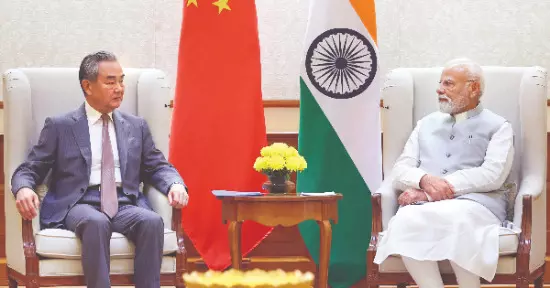India, China agree to re-open border trade through three points, resume direct flights

NEW DELHI: India and China on Tuesday agreed to revive dialogue mechanisms, resume direct flights, and enhance trade and investment flows, signaling a reset in ties that had come under severe strain after the Galwan Valley clashes in eastern Ladakh in 2020.
The two neighbours agreed to reopen border trade through three designated trading points—Lipulekh Pass, Shipki La Pass, and Nathu La Pass. They also committed to facilitating trade and investment flows between the two countries through concrete measures.
The Ministry of External Affairs (MEA) said in a statement on Tuesday that both sides had agreed to jointly maintain peace and tranquility in the border areas through friendly consultations.
Both countries also agreed to resume direct flight connectivity between mainland China and India at the earliest and to finalize an updated Air Services Agreement. They further agreed to facilitate visas for tourists, businesspersons, media representatives, and other visitors in both directions.
Additionally, the two sides decided to continue and expand the scale of the Indian pilgrimage to Mt. Kailash (Gang Renpoche) and Lake Manasarovar (Mapam Yum Tso) in Tibet Autonomous Region of China, beginning in 2026.
During the meeting between External Affairs Minister S. Jaishankar and his visiting Chinese counterpart Wang Yi, the two sides held positive, constructive, and forward-looking discussions on bilateral, regional, and international issues of common interest. They reached a number of understandings and practical outcomes on people-centric and economic engagement.
Both sides underscored that the strategic guidance of the leaders of India and China plays an irreplaceable and crucial role in the development of bilateral relations. Sharing the view of promoting sustained, sound, and steady development of ties, they agreed that a stable, cooperative, and forward-looking relationship is in their mutual interest to fully realize their development potential.
They also agreed to support each other in hosting major diplomatic events. China will support India in hosting the 2026 BRICS Summit, while India will support China in hosting the 2027 BRICS Summit.
Furthermore, the two countries agreed to explore and resume various official bilateral dialogue mechanisms and exchanges to enhance cooperation, address each other’s concerns, and properly manage differences. This includes holding the Third Meeting of the India-China High-Level Mechanism on People-to-People Exchanges in India in 2026.
The two sides also exchanged views on cooperation regarding trans-border rivers and agreed to make full use of the India-China Expert-Level Mechanism on Trans-Border Rivers. They committed to maintaining communication on the renewal of relevant MoUs. China agreed to share hydrological information during emergency situations on humanitarian grounds.
According to the MEA statement, both countries agreed to uphold multilateralism, enhance communication on major international and regional issues, maintain a rules-based multilateral trading system with the WTO at its core, and promote a multipolar world that safeguards the interests of developing countries.
China agrees key concerns of India, the sources said.
“Foreign Minister Wang Yi assured External Affairs Minister Jaishankar that China is addressing India’s needs of fertilisers, rare earths and tunnel boring machines,” one of the sources said.
Jaishankar had on Monday said, without providing details, that he brought up “particular concerns” in the meeting that he had flagged during his visit to Beijing last month as well.
There was no official word on the matter from either side.
Rare earth minerals are considered vital for high-end technology products, including electric vehicles (EVs), drones, and battery storage. China has been a dominant player in the critical minerals supply chain globally.
India has been looking at a steady supply of rare earth minerals to fuel its economic growth. China accounts for around 70 per cent of global rare earth mining that makes it a very dominant player in the global supply chain of the critical minerals.
China used to export huge quantities of fertiliser to India till 2023.
However, Beijing stopped the supplies to a large number of countries last year. It lifted the restrictions in June but did not relax the norms for resuming exports to India.
It is learnt that Beijing has stopped export of tunnel boring machines to India.
There have been renewed efforts by the two sides to reset their ties that witnessed severe strain following the eastern Ladakh border row.mpost



